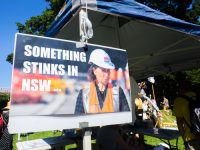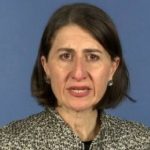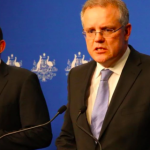Berejiklian’s Moves Quickly to Consolidate Power and Silence Dissent

The Berejiklian government seems to have taken its election win as an indication from the NSW electorate that it has carte blanche over its governing of the state, as in a little over a week after its return to office, it made some unprecedented moves to consolidate power.
Under the Administrative Arrangements (Administrative Changes—Public Service Agencies) Order 2019 – which was made on 2 April – the returned Liberal Nationals government concentrated the state’s public services into eight departments, down from ten.
Significantly, the Coalition scrapped the Office of the Environment and Heritage (OEH), which was the department tasked with state environmental protection oversight. The environment portfolio will be swallowed up by NSW Planning: an ominous greenlight for developers.
And the soon-to-be formed Planning and Industry super-department will also be incorporating the Office of Local Government. This will obviously see concerns raised by local councils in regard to projects backed by planning minister Rob Stokes or industry minister John Barilaro firmly silenced.
The premier told reporters last Friday that the merging of the various departments is all about delivering “better services, better infrastructure, in a more timely manner”. And Berejiklian has explained little else. But, why should she? She’s been handed a blank cheque to do as she pleases.
Gagging opposing voices
“Subsuming local government and the environment in planning will degrade their capacity to effectively respond within government in those areas,” said NSW Greens MP Jamie Parker, who was just voted in for a third term as member for Balmain.
“The result of this will be a lessening of the voice for the environment in government,” the Greens planning spokesperson continued, “and the marginalisation of local government when it comes to planning considerations.”
According to Parker, local councils “have long been a thorn in the side” of the NSW government. But now, with the powers vested in the Local Government Act 1993 falling into the hands of the planning minister, the voice and power of local councils will be lost in the state bureaucracy.
Opposing your own
And at a time when climate change has become a primary issue for the Australian public, Gladys has come out swinging, making changes that ensure any environmental considerations will be superseded by the interests of infrastructure projects or the priorities of industry.
“The Office of the Environment is the voice for the environment in government,” Mr Parker told Sydney Criminal Lawyers. “By loading it into planning, as a tiny element of this mega bureaucracy, means their voice will be diminished, and their independence will be jeopardised.”
In the past, the OEH often played a key dissenting role in opposing planning projects that threatened environmental degradation. However, in order to maintain that role, those advocating for environment will now be speaking out against their own senior management.
Exterminating Blinky
The Berejiklian government is well aware of the stifling effect that engulfing environment within planning will have. Indeed, the Coalition government has long seen environmental concerns as a hindrance to its neoconservative agenda.
In 2016, the NSW government repealed the Threatened Species Conservation Act 1995, while the Native Vegetation Act 2003 was dropped the following year. This resulted in much weaker environmental assessments and protections, particularly on private land.
The easing of the native vegetation protections led to a daily clearance rate of about fourteen football fields of koala habitat. In 2016-17, 2,845 hectares of NSW forest and woodland was cleared, while over 2017-18, this jumped to 8,194 hectares.
And while these measures appease Liberal National backers, they’re also causing the eradication of the koala. It’s dwindling numbers have led organisations like the World Wildlife Fund to call for it to be listed as an endangered species for fears it could become extinct in this state by 2050.
Elevating the risk
Another development that has raised eyebrows is the merging of the Department of Family and Community Services (FACS) with Justice. This will bring together those who deliver services to marginalised people with those who administer the state’s correctional facilities.
“It’s very problematic,” said NSW Greens MLC David Shoebridge. “Because we want to break that institutional link between FACS and Justice, in the sense of young people moving into out-of-home care, then into juvenile justice and graduating into adult prison.”
Mr Shoebridge explained that there’s an “undoubtable link” between children who are forcibly removed from their families subsequently getting caught in the revolving door of the criminal justice system.
The Greens justice spokesperson has grave concerns that “this government, and the ministers that they’ve chosen, are going to further entrench that cycle”, rather than work collaboratively to break the link between out-of-home care and prison.
The continuing stolen generations
And again, its First Nations peoples that will disproportionately bear the brunt of any increased risk the merger of FACS and Justice will produce. Currently, around 37 percent of young people in out-of-home care are Indigenous, while they only account for 5 percent of the state population under 18.
Last November, the Berejiklian government served up further injustice to the First Peoples of this land, when it passed legislation that requires a decision to be made as to whether a child in out-of-home care can be returned to their family within 24 months, and if not, they’re to be adopted out.
Grandmothers Against Removals founding member Aunty Hazel Collins explained in February that the forced adoption laws don’t “allow families the time frame to adequately fight through the judicial system to get their children back.” And she described this as a form of cultural genocide.
Return of the conservatives
Mr Shoebridge further said that he fears the merging of the departments reveals that the Berejiklian government “is even more out of touch, with a handful of extraordinarily powerful, but distant, ministers, directing a very complex machine, which is the NSW government”.
And with another four years up her sleeve, and highly opposed projects such as WestConnex and the Allianz Stadium redevelopment forging ahead, who knows what Berejiklian has next in her sights. But, one thing is for sure, these mergers have cleared the way to make her government’s plans easier.
“It also deskills the public service. It removes critical checks and balances,” Mr Shoebridge warned. “With this push for an efficient, centralised administration, we know from experience, it’s individual people with their individual needs who end up getting run over.”







